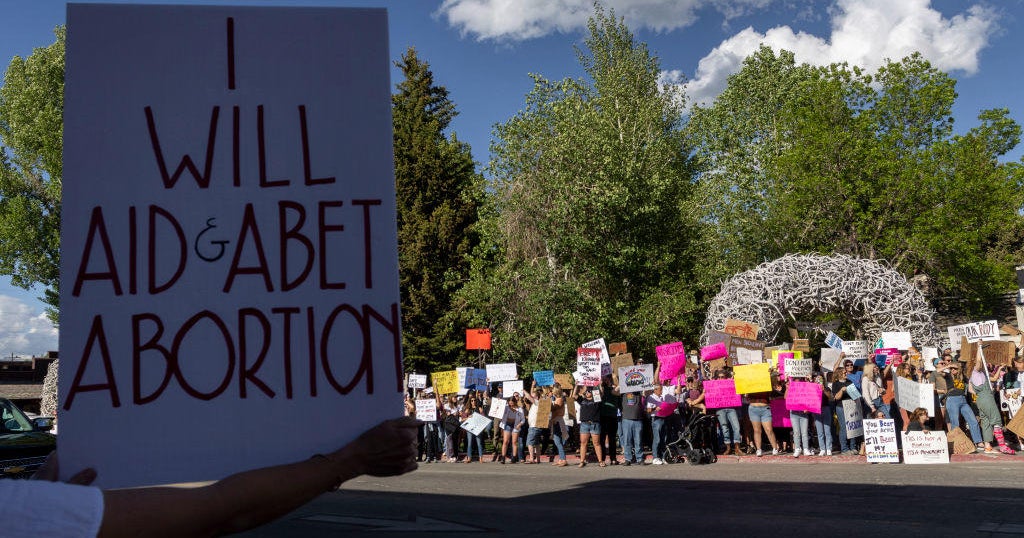A state judge on Monday overturned the blanket ban on abortion in Wyoming and the explicit ban on abortion in the United States ban on the use of drugs to terminate pregnancy in line with voters in even more states expressing support for abortion rights.
Since 2022, Teton County District Judge Melissa Owens has consistently ruled three times to block the laws while they were challenged in court.
The decision marks another victory for abortion rights advocates, following voters in seven states measures adopted to support access.
A Wyoming law that Owens says violates women’s rights under the state constitution bans abortion except to protect the life of a pregnant woman or in cases of rape and incest. The other made Wyoming the only state to explicitly ban abortion pills, although other states have instituted de facto bans on the medication by broadly banning abortion.
The laws were challenged by four women, including two midwives, and two nonprofits. One of the groups, Wellspring Health Access, opened in April 2023 as the state’s first full-service abortion clinic in years following a 2022 arson.
“This is a wonderful day for the people of Wyoming – and for women everywhere who should have control over their own bodies,” Julie Burkhart, president of Wellspring Health Access, said in a statement.
NATALIE BEHRING / Getty Images
In the recent election, Missouri voters cleared the way to overturn one of the nation’s most restrictive abortion bans, in a series of victories for abortion rights advocates. Florida, Nebraska and South Dakota, meanwhile, rejected similar constitutional amendments, leaving bans in place.
Abortion rights amendments have also passed in Arizona, Colorado, Maryland and Montana. Nevada voters also approved an amendment supporting abortion rights, but they will have to approve it again in 2026 for it to take effect. Another banning discrimination based on “pregnancy results” made the rounds in New York.
The abortion landscape underwent a seismic shift in 2022 when the The U.S. Supreme Court overturned Roe v. Wadea ruling that ended a nationwide right to abortion and paved the way for bans to take effect in most Republican-controlled states.
Currently, 13 states maintain bans on abortion at all stages of pregnancy, with limited exceptions, and four states bans starting around six weeks into pregnancy – often before women realize they are pregnant.
Almost every ban has been challenged with a lawsuit. Courts have blocked enforcement of some restrictions, including bans during pregnancy in Utah and Wyoming. Judges lifted the bans in Georgia and North Dakota in September 2024. Georgia’s Supreme Court ruled the following month that the ban can be upheld there while it hears the case.
In the Wyoming case, the women and nonprofits challenging the laws argued that the bans would harm their health, well-being and livelihoods, claims that are disputed by attorneys for the state. They also argued that the bans violated a 2012 constitutional amendment stating that competent Wyoming residents have the right to make their own health care decisions.
As with previous rulings, Owens found both arguments valuable. The abortion ban “will undermine the integrity of the medical profession by hindering physicians’ ability to provide evidence-based medicine to their patients,” Owens ruled.
The abortion laws interfere with women’s fundamental right to make health care decisions for an entire class of people — those who are pregnant — in violation of the constitutional amendment, Owens ruled.
Voters in Wyoming approved the amendment, fearing government overreach following the passage of the federal Affordable Care Act and initial requirements for people to have health insurance.
Attorneys for the state argued that health care, under the amendment, did not include abortion. Republican Gov. Mark Gordon, whose administration has defended the 2022 and 2023 laws, did not immediately return an email message seeking comment Monday.
Both sides wanted Owens to rule on the lawsuit challenging the abortion ban, rather than having it go to trial in the spring. A three-day trial for Owens was previously set, but will not be necessary with this ruling.
